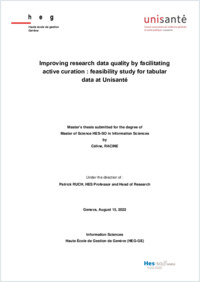Improving research data quality by facilitating active curation : feasibility study for tabular data at Unisanté
SONAR|HES-SO
- Racine, Céline
- Ruch, Patrick (Degree supervisor)
- Genève : Haute école de gestion de Genève
156 p.
Master of Science HES-SO en Information documentaire: Haute école de gestion de Genève, 2022
English
To achieve a good level of quality when research data are shared, the FAIR principles have been established. They drive research teams to create data that are Findable, Accessible, Interoperable and Reusable. To implement these recommendations, data curation activities are performed at the end of the research project. They include data transformation, data enrichment, data anonymization or documentation. However, the concept of data quality is not restricted to data sharing. It is followed throughout the research project, by the implementation of data management best practices, by data preparation and data cleaning and by the compliance with various regulations, such as the Good Clinical Practices (GCP).
At Unisanté, a data curation workflow is processed on datasets shared on the institutional repository. The documentation and data unit (UDD) has identified that 40% of the datasets need additional treatment to reach a good level of quality before sharing, even if best practices seem to be applied.
This study aims to collect information on the use of best practices at Unisanté during a research project, on the data-related support wanted by the research teams and on potential possibilities of improvement in terms of data quality. The scope has been restricted to tabular data only, as free text data are handled differently. This information has been collected through a survey, interviews with research teams and interviews with Unisanté support services. From the analysis of this collected information, it can be concluded that the integration of active data curation into the research project would have a positive impact on data quality.
The results show that a form of support is wanted for some activities, mainly the data management plan, the anonymization and de-identification processes, the documentation, the data monitoring, the interoperability and data matching. The recommendations for Unisanté to support these activities would be the implementation of new services, such as an anonymization support service and a Data Protection Officer (DPO), the technical integration of interoperable pre-set fields into REDCap, the creation of a centralized data monitoring service or the improvement of available training courses.
This study also highlights the need for a better data governance at Unisanté and an improvement of the data-related infrastructure, mainly the archival system and the data repository.
At Unisanté, a data curation workflow is processed on datasets shared on the institutional repository. The documentation and data unit (UDD) has identified that 40% of the datasets need additional treatment to reach a good level of quality before sharing, even if best practices seem to be applied.
This study aims to collect information on the use of best practices at Unisanté during a research project, on the data-related support wanted by the research teams and on potential possibilities of improvement in terms of data quality. The scope has been restricted to tabular data only, as free text data are handled differently. This information has been collected through a survey, interviews with research teams and interviews with Unisanté support services. From the analysis of this collected information, it can be concluded that the integration of active data curation into the research project would have a positive impact on data quality.
The results show that a form of support is wanted for some activities, mainly the data management plan, the anonymization and de-identification processes, the documentation, the data monitoring, the interoperability and data matching. The recommendations for Unisanté to support these activities would be the implementation of new services, such as an anonymization support service and a Data Protection Officer (DPO), the technical integration of interoperable pre-set fields into REDCap, the creation of a centralized data monitoring service or the improvement of available training courses.
This study also highlights the need for a better data governance at Unisanté and an improvement of the data-related infrastructure, mainly the archival system and the data repository.
- Language
-
- English
- Classification
- Information, communication and media sciences
- Notes
-
- Haute école de gestion de Genève
- Information documentaire
- hesso:hegge
- Persistent URL
- https://folia.unifr.ch/global/documents/323072
Statistics
Document views: 196
File downloads:
- Racine_Celine_TM_2022.pdf: 351
